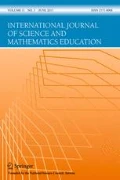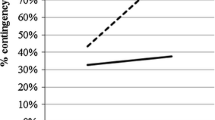Abstract
Success in problem-based learning requires both strong information literacy to search for, evaluate, and use information effectively, and argumentation skills to generate coherent arguments. This study investigated the positive and negative effects of computer-based scaffolding to support high-school credit recovery students’ information literacy and argumentation skills in a problem-based learning unit on air quality. Virtual field trips and the Connection Log were designed and developed to provide scaffolding that supported students in addressing conceptual, metacognitive, and strategic challenges. Results revealed that diverse students can use scaffolding in different ways on the basis of distinct goals and prior experiences. These findings imply that information literacy and argumentation skills supported by computer-based scaffolding are pivotal factors in problem-based learning for science education.



Similar content being viewed by others
References
Akerlind, G. (2005). Phenomenographic methods: A case illustration. In J. A. Bowden & P. Green (Eds.), Doing developmental phenomenography (pp. 103–127). Melbourne: RMIT University Press.
American Library Association. (2000). Information literacy competency standards for higher education. Chicago, IL: Association of College and Research Libraries.
Arnone, M. P., Small, R. V., & Reynolds, R. (2010). Supporting inquiry by identifying gaps in student confidence: Development of a measure of perceived competence. School Libraries Worldwide, 16(1), 47–60 Retrieved from: http://ssrn.com/abstract=1755656.
Belland, B. R. (2011). Distributed cognition as a lens to understand the effects of scaffolds: The role of transfer of responsibility. Educational Psychology Review, 23(4), 577–600.
Belland, B. R., Walker, A. E., & Kim, N. J. (2017). Bayesian network meta-analysis to synthesize the influence of contexts of scaffolding use on cognitive outcomes in STEM education. Review of Educational Research, 87(6), 1042–1081.
Belland, B. R., Weiss, D. M., Kim, N. J., Piland, J., & Gu, J. (2019). An examination of credit recovery students’ use of computer-based scaffolding in a problem-based, scientific inquiry unit. International Journal of Science and Mathematics Education, 17(2), 273–293.
Banic, A., & Gamboa, R. (2019, March). Visual design problem-based learning in a virtual environment improves computational thinking and programming knowledge. In 2019 IEEE Conference on Virtual Reality and 3D User Interfaces (VR) (pp. 1588–1593). IEEE.
Barrows, H. S., & Tamblyn, R. (1980). Problem-based learning: An approach to medical education. New York, NY: Springer.
Buchanan, S., Harlan, M. A., Bruce, C. S., & Edwards, S. L. (2016). Inquiry based learning models, information literacy, and student engagement: A literature review. School Libraries Worldwide, 22(2), 23–39. https://doi.org/10.1426/5.22.2.03.
Cardetti, F., & LeMay, S. (2019). Argumentation: Building students’ capacity for reasoning essential to learning mathematics and sciences. PVFTSUS, 29(8), 775–798.
Cheng, K. H., & Tsai, C. C. (2019). A case study of immersive virtual field trips in an elementary classroom: Students’ learning experience and teacher-student interaction behaviors. Computers & Education, 140, 1–15.
Choi, Y. S., Kim, C. J., & Choe, S. U. (2018). Development and application of learning on geological field trip utilizing on social construction of scientific model. Journal of the Korean Earth Science Society, 39(2), 178–192. https://doi.org/10.5467/jkess.2018.39.2.178.
Creswell, J. W. (2003). Research design: Qualitative, quantitative, and mixed methods approaches (2nd ed.). Thousand Oaks, CA: Sage.
Diekema, A. R., Holliday, W., & Leary, H. (2011). Re-framing information literacy: Problem-based learning as informed learning. Library & Information Science Research, 33(4), 261–268.
Ertmer, P. A., & Glazewski, K. D. (2019). Scaffolding in PBL environments: Structuring and problematizing relevant task features. In M. Moallem, W. Hung, & N. Dabbagh (Eds.), The Wiley handbook of problem-based learning (pp. 321–342). Hoboken, NJ: John Wiley & Sons.
Gijbels, D., Dochy, F., Van den Bossche, P., & Segers, M. (2005). Effects of problem-based learning: A meta-analysis from the angle of assessment. Review of Educational Research, 75, 27–61. https://doi.org/10.3102/00346543075001027.
Glazewski, K. D., & Hmelo-Silver, C. E. (2019). Scaffolding and supporting use of information for ambitious learning practices. Information and Learning Sciences, 120(1/2), 39–58.
Ivankova, N. V., Creswell, J. W., & Stick, S. L. (2006). Using mixed-methods sequential explanatory design: From theory to practice. Field Methods, 18(1), 3–20.
Kim, N. J., Belland, B. R., & Walker, A. E. (2018a). Effectiveness of computer-based scaffolding in the context of problem-based learning for STEM education: Bayesian meta-analysis. Educational Psychology Review, 30(2), 397–429.
Kim, N. J., Belland, B. R., & Axelrod, D. (2018b). Scaffolding for optimal challenge in K-12 problem-based learning. Interdisciplinary Journal of Problem-based Learning, 13(1), 1–23.
Kim, N. J., Belland, B. R., Lefler, M., Andreasen, L., Walker, A., & Axelrod, D. (2020) Comparison of computer-based scaffolding targeting individuals versus groups in complex problem solving: Meta-analysis. Educational Psychology Review, 32, 415–461.
Klippel, A., Zhao, J., Jackson, K. L., La Femina, P., Stubbs, C., Wetzel, R., & Oprean, D. (2019). Transforming earth science education through immersive experiences: Delivering on a long held promise. Journal of Educational Computing Research, 57(7), 1745–1771.
Kovalik, C. L., Yutzey, S. D., & Piazza, L. M. (2012). Assessing change in high school student information literacy using the tool for real-time assessment of information literacy skills. Contemporary Issues in Education Research (CIER), 5(3), 153–166.
Kramarski, B., & Gutman, M. (2006). How can self-regulated learning be supported in mathematical E-learning environments? Journal of Computer Assisted Learning, 22(1), 24–33.
Krippendorff, K. (2004). Reliability in content analysis. Human Communication Research, 30(3), 411–433. https://doi.org/10.1111/j.1468-2958.2004.tb00738.x.
Looi, C.-K., & Lim, K.-S. (2009). From bar diagrams to letter-symbolic algebra: A technology-enabled bridging. Journal of Computer Assisted Learning, 25, 358–374.
Macklin, A. S. (2001). Integrating information literacy using problem-based learning. Reference Services Review, 29(4), 306–314.
Malmia, W., Makatita, S. H., Lisaholit, S., Azwan, A., Magfirah, I., Tinggapi, H., & Umanailo, M. C. B. (2019). Problem-based learning as an effort to improve student learning outcomes. International Journal of Scientific & Technology Research, 8(9), 1140–1143.
Manny, K., & Ellis, R. (2019). Active learning strategies and tools for asynchronous online information literacy instruction. In Library Technology Conference, St. Paul, MN.
McNeill, K. L., Lizotte, D. J., Krajcik, J., & Marx, R. W. (2006). Supporting students' construction of scientific explanations by fading scaffolds in instructional materials. The Journal of the Learning Sciences, 15(2), 153–191. https://doi.org/10.1207/s15327809jls1502_1.
Mead, C., Buxner, S., Bruce, G., Taylor, W., Semken, S., & Anbar, A. D. (2019). Interactive virtual field trips promote science learning. Journal of Geoscience Education, 67(2), 131–142.
Merritt, J., Lee, M. Y., Rillero, P., & Kinach, B. M. (2017). Problem-based learning in K–8 mathematics and science education: A literature review. Interdisciplinary Journal of Problem-Based Learning, 11(2). https://doi.org/10.7771/1541-5015.1674.
Minocha, S., Tilling, S., & Tudor, A. D. (2018, April). Role of virtual reality in geography and science fieldwork education. In Knowledge Exchange Seminar Series, Learning from New Technology, Belfast.
Moselen, C., & Wang, L. (2014). Integrating information literacy into academic curricula: A professional development programme for librarians at the University of Auckland. The Journal of Academic Librarianship, 40(2), 116–123.
National Research Council (NRC). (2012). A framework for k-12 science education: Practices, crosscutting concepts, and core ideas. Washington, DC: The National Academy Press.
Noroozi, O., Kirschner, P. A., Biemans, H. J., & Mulder, M. (2018). Promoting argumentation competence: Extending from first-to second-order scaffolding through adaptive fading. Educational Psychology Review, 30(1), 153–176. https://doi.org/10.1007/s10648-017-9400-z.
Parong, J., & Mayer, R. E. (2018). Learning science in immersive virtual reality. Journal of Educational Psychology, 110(6), 785–797. https://doi.org/10.1037/edu0000241.
Poitras, E., Butcher, K. R., Orr, M., Hudson, M. A., & Larson, M. (2019). Predicting student understanding by modeling interactive exploration of evidence during an online science investigation. Interactive Learning Environments, 1–13. https://doi.org/10.1080/10494820.2019.1689146.
Rashid, T., & Asghar, H. M. (2016). Technology use, self-directed learning, student engagement and academic performance: Examining the interrelations. Computers in Human Behavior, 63, 604–612. https://doi.org/10.1016/j.chb.2016.05.084.
Rockman, I. F. (2019). Integrating information literacy into the learning outcomes of academic disciplines: A critical 21st-century issue. College & Research Libraries News, 64(9), 612–615.
Rosen, L. D., Whaling, K., Carrier, L. M., Cheever, N. A., & Rokkum, J. (2013). The media and technology usage and attitudes scale: An empirical investigation. Computers in Human Behavior, 29(6), 2501–2511. https://doi.org/10.1016/j.chb.2013.06.006.
Salem, J. A., Jr. (2014) The development and validation of all four TRAILS (tool for real-time assessment of information literacy skills) tests for K-12 students (Doctoral dissertation). Retrieved from ProQuest dissertations & theses (Publication number 1649152764).
Savery, J. R. (2019). Comparative pedagogical models of problem-based learning. In M. Moallem, W. Hung, & N. Dabbagh (Eds.), The Wiley handbook of problem-based learning (pp. 81–104). Hoboken, NJ: John Wiley & Sons.
Schloman, B. F., & Gedeon, J. A. (2007). Creating TRAILS: Tool for real-time assessment of information literacy skills. Knowledge Quest, 35(5), 44–47.
Sheskin, D. J. (2003). Handbook of parametric and nonparametric statistical procedures. Boca Raton, FL: CRC Press.
Simons, K. D., & Klein, J. D. (2007). The impact of scaffolding and student achievement levels in a problem-based learning environment. Instructional Science, 35(1), 41–72.
Sinatra, G. M., Kienhues, D., & Hofer, B. K. (2014). Addressing challenges to public understanding of science: Epistemic cognition, motivated reasoning, and conceptual change. Educational Psychologist, 49(2), 123–138. https://doi.org/10.1080/00461520.2014.916216.
Toulmin, S. (1958). The uses of argument. Cambridge: Cambridge University Press.
Turner, B., Fuchs, C., & Todman, A. (2015). Static vs. dynamic tutorials: Applying usability principles to evaluate online point-of-need instruction. Information Technology and Libraries, 34(4), 30–54. https://doi.org/10.6017/ital.v34i4.5831.
van de Pol, J., Volman, M., & Beishuizen, J. (2010). Scaffolding in teacher–student interaction: A decade of research. Educational Psychology Review, 22(3), 271–296.
Voelker, T. J., Schloman, B. F., & Gedeon, J. A. (2013). Pathways for success: The evolution of TRAILS and transitioning to college. In K. J. Burhanna (Ed.), Libraries supporting the high school to college transition (pp. 209–216). Santa Barbara, CA: ABC-CLIO.
Wallon, R. C., Jasti, C., Lauren, H. Z., & Hug, B. (2018). Implementation of a curriculum-integrated computer game for introducing scientific argumentation. Journal of Science Education and Technology, 27(3), 236–247. https://doi.org/10.1007/s10956-017-9720-2.
Wiley, J., Goldman, S. R., Graesser, A. C., Sanchez, C. A., Ash, I. K., & Hemmerich, J. A. (2009). Source evaluation, comprehension, and learning in internet science inquiry tasks. American Educational Research Journal, 46(4), 1060–1106.
Wood, D., Bruner, J. S., & Ross, G. (1976). The role of tutoring in problem solving. Journal of Child Psychology and Psychiatry, 17(2), 89–100.
Yurdugül, H. (2008). Minimum sample size for Cronbach’s coefficient alpha: A Monte-Carlo study. Hacettepe Üniversitesi Eğitim Fakültesi Dergisi, 35, 397–405.
Author information
Authors and Affiliations
Corresponding author
Supplementary Information
ESM 1
(DOCX 70 kb)
Rights and permissions
About this article
Cite this article
Kim, N.J., Vicentini, C.R. & Belland, B.R. Influence of Scaffolding on Information Literacy and Argumentation Skills in Virtual Field Trips and Problem-Based Learning for Scientific Problem Solving. Int J of Sci and Math Educ 20, 215–236 (2022). https://doi.org/10.1007/s10763-020-10145-y
Received:
Accepted:
Published:
Issue Date:
DOI: https://doi.org/10.1007/s10763-020-10145-y




